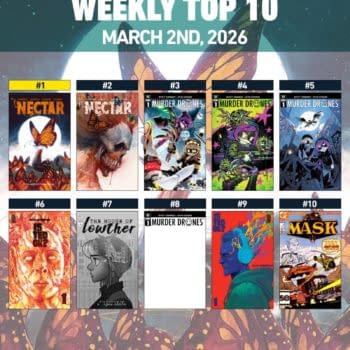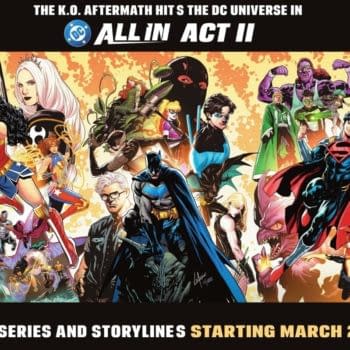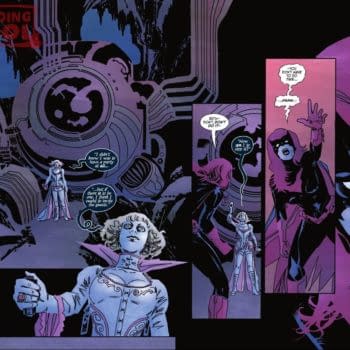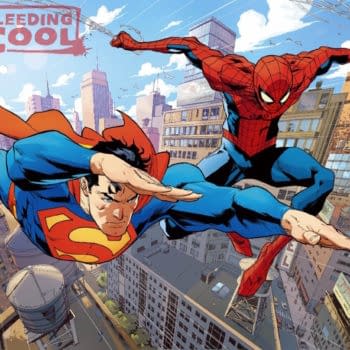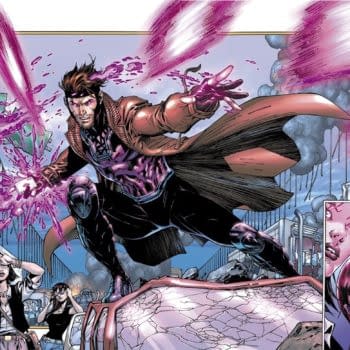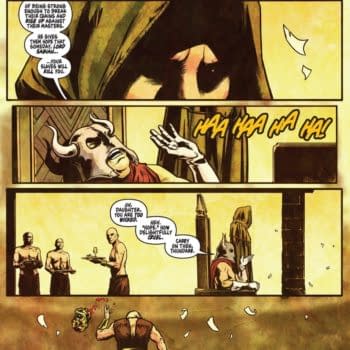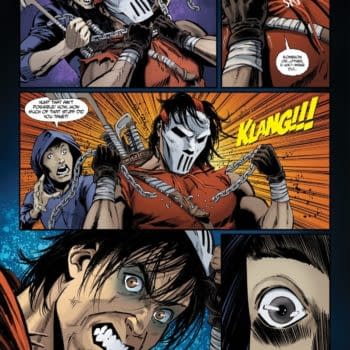Posted in: Comics, Recent Updates | Tagged: america's got powers, Comics, eric stephenson, fatale, frank cho, image, manhattan projects, todd mcfarlane
The Bleeding I – Talking With Eric Stephenson About Image Selling Out

Okay, to business.
Rich: Every several months, we seem to get a boom in attention over a bunch of creator owned books. The last time was around the release of Nonplayer, Butcher Baker and the like – then there seemed to be a pause, despite very interesting books being published – now we suddenly get all sorts of interest over Saga, Peter Panzerfaust, Supurbia, No Place Like Home and Hell Yeah. Do you have any thoughts on what causes these blips?
Eric: I think you're skipping over Fatale, Whisper, Alpha Girl, Thief of Thieves and The Manhattan Projects, along with Prophet and Glory, and I think you can go back even further than that, really, because things like The Strange Talent of Luther Strode, Mudman, and The Red Wing are part of this as well. There's also the newly revitalized Witchblade with Tim Seeley at the helm, and on the heals of that, David Hine is doing some brilliant work on The Darkness. The Walking Dead #95 has hit stores, it's the highest selling issue of that series to date.
I don't know that I'd characterize several months of steadily growing momentum as a "blip," but I think there's a very really feeling amongst readers and retailers alike that re-hashing the same handful of stories over and over again no longer holds the same appeal. It's like that Smiths song, "Paint a Vulgar Picture," but instead of "reissue, repackage, repackage," it's "retread, revamp, renumber." I think people are just growing weary of the never-ending practice of trying to make everything old seem new again, especially when there is a load of vital new work out there – and not just from Image.
Rich: You've been vocally critical about Marvel and DC going to the well over company owned properties such as Avengers Vs X-Men and Before Watchmen. Can you see how people may think the same about the Extreme Relaunch with Glory, Youngblood, Prophet and Supreme – which has its own Alan Moore history being redone?
Eric: Well, first off, the Extreme Relaunch isn't the centerpiece of our publishing plans during 2012, whereas for Marvel and DC, things like Avengers vs. X-Men and Before Watchmen are.
That said, what we are focusing on during 2012 is new creativity, and to varying degrees, I think the Extreme books meet that criteria. There's more creativity in the launch issues of the Extreme books than there has been in the last 20 years of books from Marvel and DC. I mean, Prophet and Glory are really only similar to the original series in name. Youngblood and Bloodstrike aren't treading over the same ground as previous incarnations. With Supreme, we're publishing the last issue Alan wrote because it seemed stupid and disrespectful – both to Alan and to fans of his run – not to, but where Erik Larsen takes the series from there will be quite different. Also, it kind of helps that we're doing the Extreme books in cooperation with Rob, as opposed to against his wishes.
I guess the thing people either don't get or don't want to acknowledge is that with both Avengers vs. X-Men and Before Watchmen, the publishers involved are blatantly capitalizing on former glories. They're banking on those projects being huge successes.
Meanwhile, Rob and I – and all the writers and artists involved – knew going into the Extreme relaunch that we had an uphill battle ahead of us. Not a one of these books could be viewed as a sure thing or a safe bet. There was no marketing plan based around the long-term success of a book that became a successful film in 2009, or a highly anticipated movie that's coming out this May. We did them because Rob and I love these characters and believe that despite being out of print for over 10 years, they're still full of potential. We're not doing it because there's some spreadsheet or graph that says it's an easy road to riches or whatever. Relaunching these books was a tremendous gamble, and there's absolutely no comparison at all between the success of something like Glory or Prophet and the kind of numbers Marvel will get on Avengers vs. X-Men. We took a risk on these books, just as we do with every single comic we publish, and you know what the risk is on something like AvX or Before Watchmen?
Fucking nil.
And the whole Before Watchmen thing just gets my back up, especially when people try to claim Alan and Dave didn't create anything new, that they were just re-doing the Charlton characters. No, that is not what happened. If they had just re-cast the Charlton characters, it would have been super-obvious, but as it stands, the only reason we know Watchmen started out with the Charlton characters is because Alan and Dave were upfront about the genesis of their ideas. I mean, seriously – who looks at Nite Owl and says, "Okay, that's obviously Blue Beetle"? Put The Comedian next to The Peacemaker, with that bloody big helmet of his, and tell me how similar they look. It's ridiculous. The Charlton characters were the raw materials and Alan and Dave took them and created something remarkable and new out of them. To suggest otherwise is like saying there's no difference between a building and a pile of bricks.
Rich: How do you feel about the use of Kickstarter by creators to fund the production of Image Comics. Is it something you encourage? Does it worry you that for some people the only way to fund work is by, basically, begging?
Eric: It's not something I think about, to be honest. I pay about as much attention to Kickstarter as I do to Facebook or Twitter, which is essentially none at all.
If there are people getting some use out of it, then great. More power to them.
Rich: Facebook or Twitter don't usually have quite so many people handing over five or six figure sums of money, and seems, for some, to be making up the funding gap that has doomed some Image comics at early stages. It feels like Kickstarter and their ilk could be Image's best friend. Hell, you could even set one up yourselves. Doesn't it behoove you to pay this model some attention?
Eric:You know, it seems like a great way for people to get their projects funded and made, but I think there's a difference between successfully raising funding for something and actually creating something of value. I'm not saying it doesn't happen, because obviously there are things like Jimmy's Queen Crab out there, but you know, there's also that Smiths tribute book, which was a nice idea, but kind amateurish in execution.
Image's best friend is fire and skill. Justin Jordan and Tradd Moore didn't come to us with Kickstarter funding, they came to us with a burning desire to create awesome comics. Which they did, and surprise – people took notice. And before them, guys like Terry Moore and Jeff Smith made their own way by self-publishing the comics they wanted to do. They sat down, wrote and drew their comics, and put them out. Adrian Tomine put out Optic Nerve as mini-comics before going to D&Q. I could give you loads of examples, but my point is that if your'e capable of sitting down and doing the work, it's not that hard to get going. I mean – there's an old interview with Brandon Graham, where he more or less says that the best thing about creating comics is that you just need pens and paper and you can make the best comic ever sitting on a dumpster somewhere. If Kickstarter is a way for genuinely talented creators to get their work out there, that's fantastic and I hope we get some awesome comics out of it, but you know, I think the most important thing is to actually do the work. If it's good, everything else will fall into place. If it's not, all the funding in the world isn't going to help you.
Rich: Well, I understand that Image has made a change in certain policy, by instigating page rates for certain projects from prominent people, to ensure their timely creation. That's quite a change for Image, can you explain the decision, and how you decide which project to help fund in this fashion?
Eric: Well, that's not accurate, first of all, because here has been no real change in policy. There are some books we pay advances on, not page rates, and that's nothing new. That's something Image has always done, to varying degrees, depending on the creators and on the projects.
Rich: There are certain projects, such as Guns & Dinos, that have disappeared under the influence of publishers offering competing work. What to you think about Frank Cho's decision to drop the series?
Eric: That it was made at my request?
Look, here's what happened: The first issue was more or less complete, but Frank wanted to do more work on it – the story was going to wind up longer than Frank originally intended. With deadlines kind of looming for the other projects on his schedule, it became more and more clear this series was going to be monstrously late, so I told Frank we should cancel it and re-solicit when he could spend more time with it and make it the book he wants it to be.
Rich: Did anything similar occur with the 44 pages plus of the first two issues of America's Got Powers into the 38 page new issue 1 (and yes, for $2.99…)?
Eric:Yeah, Bryan, Jonathan and I went back and forth on what was happening with their story, and decided it made more sense to make #1 a really awesome experience than to ship two issues in one month. Because what was happening was material that would have gone into #2 wound up making more sense in the expanded first issue, so readers are essentially getting most of the same material they would have got over issues 1-2, but all in one go.
There's not a lot of deviation from plan here. They wanted to make an impact and originally, they were going to do that with two issues in one month. A double-sized issue priced like a single issue accomplishes the same thing.
Rich: We seem to be getting another print vs digital grudgematch with retailer Phil Boyle seeing Mark Waid as some kind of digital embodiment of evil. Where do you you stand?
Eric:Well, I stand in pretty much the same place as the last time we talked about this, Rich, which is that I think the digital audience and the print audience aren't necessarily the same. I think they may kind of cross over and feed off one another, but I think there's more than one type of reader, and I think most people hate the notion of having format dictated to them.
Predicting the demise of print comics is just kind of boring and dumb at this point, though, the same as talking about the death of vinyl was ultimately a waste of breath. At the same time, I don't see the wisdom of sticking your head in the sand and pretending digital comics are bad. They're not. I look at the sales of our print comics, and I look at the sales of our digital comics, and they're both going up. I have to think other publishers are experiencing the same thing, and I think it's because digital comics are reaching a different audience. And yes, there will be people who go from print to digital, but there will also be people who go from digital to print, or who decide they want certain things in print and everything else digital, or whatever.
But yeah, my take on all of this is that it's the future, and it's awesome to have choices.
Rich: What is Image's policy when creators fall out, or go to court over each other? This kind of thing seems inevitable when passionate people work together, but Image seems more vulnerable to it than, say, a company owned property. Does it make any difference when one of those individuals is a partner?
Eric: Not really, no. As I've said before, what happens between individual creators doesn't fall within our purview. That's between the individuals involved, and our policy is to stay out of it.
Rich: How do you believe the Image Comics Expo served the wider comic community rather than simply Image Comics?
Eric: First and foremost, because it was a comic book convention. There were a couple actors from The Walking Dead television show there, but beyond that, Image Expo was focused purely on comics and the people who create them. The people who came out to the show were comic book fans. I think intimate, narrowly focused shows like this are tremendously important for comics and for fans, because as the bigger cons turns into pop culture circuses, the opportunities to connect with the people behind the comics is diminished. One of the great things about comics is the relatively close bond between creators and fans, and I'd hate to see that broken as comic book conventions are transformed into these huge multimedia events, so hopefully things like Image Expo will continue to provide a fun experience for anyone with a love of comics.
Rich:Marvel and DC use a number of incentives, it seems, from partial returnability, to added discounts, to tiered variant covers. What can you do more to persuade retailers to stock these books in depth initially?
Eric: We do, Rich. We offer all kinds of incentives. Since the beginning of this year, retailers have been able to order the first three issues of a variety of our 2012 books and qualify for full returnability. We did that with Fatale, we did that with Saga, Thief of Thieves, Manhattan Projects… We've been offering added discounts for years, and good retailers definitely take advantage of those things.
Rich:Can Image increase their overprint further so that retailers that run out can order from you and get copies far quicker?
Eric: Of course, and we do. But you know, it's kind of a balancing act, because there are always books that don't sell out. I have a pretty strict policy of not going crazy with that stuff. I don't want to be managing a bunch of unsold inventory.
With something like Saga – we had strong orders on that, and we overprinted more than we normally would have done. The thing that sucks about the current ordering process, though, is that there's this whole FOC thing – final order cutoff – and it's never really final. So we did what we felt was a pretty aggressive overprint on Saga #1, and then orders continued coming in well after the FOC date, after the book had been printed. It's situations like that create the need for an immediate second printing, before the book's in stores, and what we did here, we went 50% higher on the print run for the second printing of Saga #1 than we normally would do, and the actual orders still surpassed that.
When something like that happens, it's both thrilling and disappointing. On one hand – it's awesome that people are responding to the work. On the other – it's just a clusterfuck across the board. More copies should have been ordered, and more copies should have been in print. The two things go hand-in-hand, though, and we set our print runs based on perceived demand. If I set every print based on how good a book is and what I personally think that book should be selling, we'd be screwed, you know? I have to be prudent with this stuff and make decisions based on the information at hand, and that information is not good reviews or good word of mouth or a gut feeling. That information is the orders we get from retailers. Give me better information, and I'll be able to set our print runs more accurately.
Rich: Every week it seems Image announce a sellout of an issue 1. And then an issue 2. Then the second print of issue 1. Then issue 3. Then the second print of issue 2. Then the third print of issue 1. This kind of thing often happens well before the comic ships. This week's reorder list was dominated by Image titles, pushing through the Avengers Vs X-Men titles with ease. And no one seems to be learning.
Why do you believe retailers aren't stocking these books in sufficient quantities, and aren't learning from past behavior?
Eric: Well, I think good retailers do stock our books in sufficient quantities. I think there are a lot of great retailers out there who genuinely love comics and listen to their customers and understand that the market is in a state of flux, that more and more readers are looking for something new. Those retailers understand that a healthy direct market is based on sustainability, not on a bunch of over-hyped events, and I think they'd rather have more books that sell well over the long haul. They're the ones – like Rick Shea over in Florida – who look at something like Saga and see a book that isn't just going to do well with its first issue, or as a monthly series, but as a series of trades that will sell and sell and sell.
That Rick had to sit down and write an open letter to the comics community explaining all that kind of underscores the problem with the direct market, though, which is that retailers like himself aren't as common as they should be.
Rich: Did everyone at Image know that Will Carlton was Todd McFarlane?
Eric: Of course.
Rich: Bastards. Clearly I need to get some better sources…






